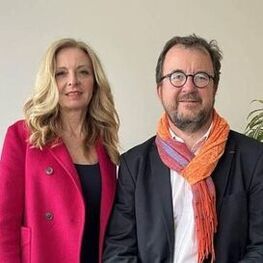Co-authors – “Des femmes et des hommes, le pouvoir en partage” (publishing house Actes Sud)
6 November 2025, at Le Fouquet’s, Paris
We were delighted to welcome Fabienne Michaille and Bertrand Badré on the occasion of the release of their book Des Femmes et des Hommes. Le pouvoir en partage (“Women and Men. Sharing Power”).
Fabienne Michaille held executive positions within the LVMH group before turning her theological research toward the role of women and their access to leadership positions. A graduate of ESSEC and holder of a postgraduate degree (Bac +7) in philosophy and theology, she is currently pursuing a doctorate in management sciences, centered on the issue of gender stereotypes and leadership. Through her company, Leadtogether, she supports organizations in implementing gender diversity policies, notably through a tool that measures gender stereotypes.
Bertrand Badré founded Blue Like an Orange Sustainable Capital. Former Managing Director and CFO of the World Bank Group, he has also served as CFO of Société Générale and Crédit Agricole, and as Deputy Representative for Africa to President Chirac. Author of Can Finance Save the World?, with a foreword by Emmanuel Macron and Gordon Brown, he regularly teaches at institutions such as Georgetown, Johns Hopkins, Princeton, and Oxford.
By intertwining their careers and commitments, Fabienne and Bertrand offer a dual-perspective reflection on contemporary issues of power and equality. Their book Des Femmes et des Hommes. Le pouvoir en partage invites readers to deeply reconsider governance dynamics in order to build a future rooted in balance, dialogue, and shared leadership.
Through a collaborative and inclusive approach centered around the keyword “together,” they examine the barriers women face in reaching leadership roles and promoting gender balance in decision-making bodies. Drawing on testimonies from leading figures such as Isabelle Kocher de Leyritz, Agnès Pannier-Runacher, Muriel Pénicaud, Paul Polman, and Denis Machuel, as well as insights from neuroscience and behavioral psychology, they shed light on persistent mechanisms of the glass ceiling: distribution of power, the weight of cultural and religious traditions, unconscious bias… And above all, they suggest concrete pathways toward a sustainable transformation of leadership.

